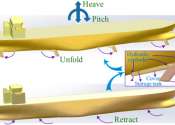Hundreds opposed changes to rooftop solar credits in Idaho: It was approved anyway
Changes have arrived to rooftop solar in Idaho, whether its proponents like it or not.
Jan 3, 2024
0
5
Energy & Green Tech

Changes have arrived to rooftop solar in Idaho, whether its proponents like it or not.
Jan 3, 2024
0
5
Engineering

Cornell engineers have refined a model that not only cultivates green energy, but also desalinates ocean water for large, drought-stricken coastal populations.
Dec 6, 2023
0
56
Energy & Green Tech

A new form of wave devouring propulsion (WDP) could power ships and help to cut greenhouse gas emissions in the maritime industry. Academics from Cranfield University have worked on the concept of using wave energy for propulsion ...
Nov 24, 2023
0
105
Energy & Green Tech

How can we ensure that an energy policy will achieve its objectives? To find out, scientists and public authorities can rely on computer models of varying degrees of accuracy. However, these models have a number of limitations, ...
Nov 6, 2023
0
10
Business

I first visited Rempang island in Summer 2022. Greeting me were lush fields lined with coconut and banana trees, picture-book fishing villages with houses jutting into the water on stilts, and boats carrying people between ...
Oct 23, 2023
0
6
Energy & Green Tech

President Joe Biden announced new "hydrogen hubs" across the United States on Friday as part of efforts to boost the economy with green energy ahead of the 2024 election.
Oct 14, 2023
0
27
Energy & Green Tech

Ships carry around 90% of traded goods and emit about 3% of global CO₂. The International Maritime Organization (IMO), the UN agency responsible for regulating shipping, recently set out plans for this industry to reach ...
Sep 28, 2023
1
2
Business

As the U.S. shifts away from fossil fuels to cleaner energy sources, thousands of coal, oil and gas workers will be looking for new jobs.
Sep 27, 2023
0
14
Energy & Green Tech

Norway has installed solar panels in its Svalbard archipelago, a region plunged in round-the-clock darkness all winter, in a pilot project that could help remote Arctic communities transition to green energy.
Sep 19, 2023
0
10
Energy & Green Tech

Norway inaugurated the world's biggest floating wind park in the North Sea on Wednesday, an emerging technology considered promising for the transition from fossil fuels to green energy.
Aug 23, 2023
0
2
Green energy is the term used to describe sources of energy that are considered to be environmentally friendly and non-polluting, such as geothermal, wind, solar, and hydro. Sometimes nuclear power is also considered a green energy source. Green energy sources are often considered "green" because they are perceived to lower carbon emissions and create less pollution.
Green energy is commonly thought of in the context of electricity, mechanical power, heating and cogeneration. Consumers, businesses, and organizations may purchase green energy in order to support further development, help reduce the environmental impacts of conventional electricity generation, and increase their nation’s energy independence. Renewable energy certificates (green certificates or green tags) have been one way for consumers and businesses to support green energy.
This text uses material from Wikipedia, licensed under CC BY-SA